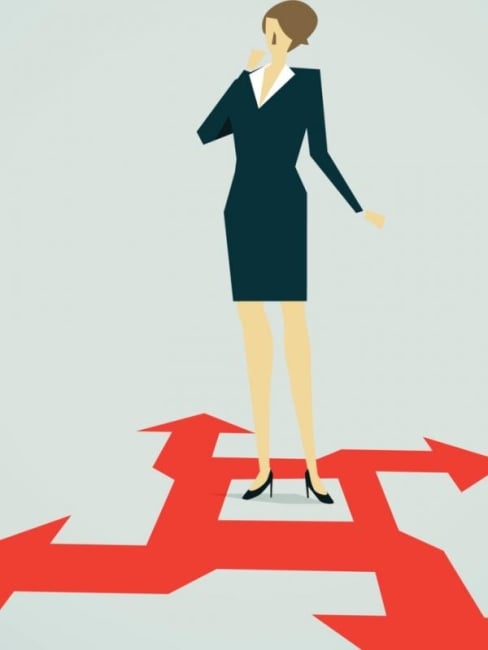You have /5 articles left.
Sign up for a free account or log in.

Istock.com/erhui
When I started graduate school both for my master’s degree and my Ph.D., I quickly absorbed an unspoken rule in some academic settings: there was a normal way to launch a career, and everyone else fell into the nontraditional category.
A normal way to launch a career was what I call the straight-line approach: finish an undergraduate program, then enter a master’s program or a Ph.D. program right way, then move into the workforce. Nothing is wrong with that approach, and I have seen it be a successful path for many people. My own career journey, however, has never followed a straight-line approach. I have transferred institutions during my undergraduate experience, worked full-time during college, taught in a public school before graduate school and switched disciplines from math education to theology to instructional design along the way.
In addition to personal choices and challenges, external factors can influence how we progress in our career goals and what progress looks like. And today, in addition to normal obstacles and changes, our world is currently experiencing a global pandemic that is having tremendous health, social and economic consequences worldwide. Many of us may not have the option to follow the plans we had or the paths we have mapped out for our lives -- at least, not right now. We do not know what will happen in the months and years ahead; all we can know is that the future may not be what we thought it would be back in January.
But normal life obstacles and a global health and financial crisis do not mean that progress on a career journey must stop. It may just take a different shape than we originally expected it would.
What and Who Defines Career Progress?
I acknowledge the many different ways that we make decisions as humans, influenced by different needs, wants, cultures and values. Some of us may be driven more by individual goals toward a desired outcome; others find their purpose in their communities or value systems, while others have still different motivations or a combination of them. We do what we need to do, what we want to do, for the reasons we do it, and we should not try to impose our version of what progress toward a career goal looks like on someone else.
I encourage us all to avoid comparing our progress and success to those of others. I carried guilt with me for the longest time that I was not progressing in my career the same way that my friends and colleagues were. I think of a particular friend who started in the same Ph.D. program at the same time as I did who has blossomed in her career, while I have often felt as if I were moving in place. I have gone through many personal, medical and social struggles that have taken me on a more wandering path at times. But what has helped me break free of my guilt has been to stop comparing myself to others and realize that my career journey is a story, and it’s my story -- not that of other people whom I admire and respect. What happened in my life and career happened, and all I can do is press ahead -- whatever ahead may look like.
More Than One Way Forward
If we imagine standing on the shore at one point along a relatively round pond, and we see a place we want to go or a person we want to talk with directly across from us, we have a few choices. Yes, the fastest way to the other side is going across the pond -- through the water to the other side. Some will choose that way and have the skills, abilities, privileges and so forth to do well. Others choose not to go that way, while still others cannot choose that option. Many of us will pick a side of the pond to walk around. Some will walk off into the woods and take a longer route to get there. Others may only be able to use paved paths, or go back to our car, drive around the block to the entrance of the pond on the other side, park and get to our destination that way.
The same can be true about our career paths. So much feels out of our control right now -- we don’t know whether or not campuses will be open, employers will be hiring, visas will be obtainable, our own health and safety will be secure. The list goes on. Steps we planned to take after this summer or this year may not be available right now -- or ever. And all this can frustrate, discourage, overwhelm and frighten us. But that’s where we are right now.
The Role of Short- and Long-Term Goals
Sometimes the best thing we can do in times like today is to focus on the next step. When I advise students and postdocs as they create or revise individual development plans (IDPs), I often suggest that they start with creating their long-term career goals first and then develop their short-term goals. Knowing your long-term goals can help you break your journey into smaller bits, creating more tangible steps you can take. And you can achieve a short-term goal that may take you in a different direction, but that can lead to the next short-term goal, which leads to the next one and so forth. Crafting good short-term goals with longer-term goals in mind can be a way to find and travel multiple paths to the same goal, overcoming obstacles along the way.
Re-Examining Our Skills, Interests and Values
When we complete an IDP like MyIDP, ChemIDP or ImaginePhD, such tools help us to define what interests us, what we are good at, who we are and what matters most in our lives. Even if we have completed them before, in times of uncertainty about our career paths, revisiting these tools and what they say about us as scholars and professionals can be a moment for us to examine what our immediate next career step can be. It may be as simple as practicing a skill, thinking through ways to express an existing interest or realigning what you are doing based on what matters most to you. These are steps that we can take that can move us forward, even if the step forward seems small.
Forward progress is still progress, even if it feels slightly sideways. What matters is having and setting goals that are based on who you are and your strengths, interests and values, and then taking any steps forward, keeping your focus on long-term goals. That may feel more like walking down stairs one at a time instead of sliding down them, but it is still forward motion. And in times like those we are currently in, sometimes one step at a time is the best we can do.
Moving Ahead
I wish I could tell each of us -- myself included -- that we will achieve the next step in our careers and development according to our particular plan, but I know that is not realistic. Instead, I suggest we examine our short-term (up to six-month) and middle-term (six- to 12-month) goals in light of the current circumstances so we can work on them to move closer to our long-term goals. I also encourage us to recognize that moving ahead is not always a straight-line action, and that progress is still progress, even if we take a longer path to make it.




